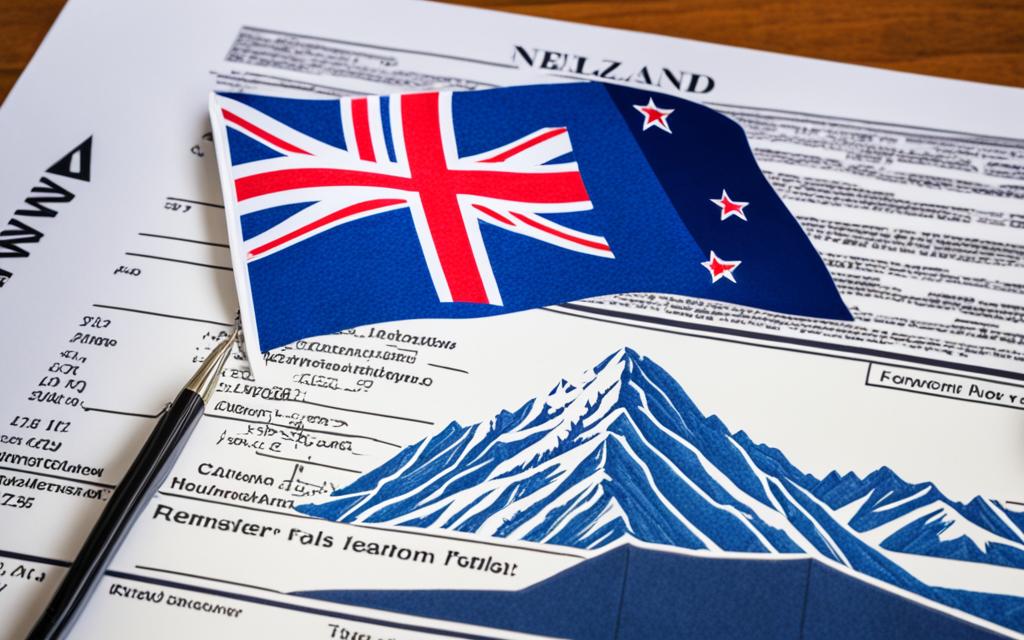Welcome to our comprehensive guide on the legal and regulatory requirements that companies operating in New Zealand must adhere to. Whether you are a local entrepreneur or considering expanding your business operations to this beautiful country, understanding the New Zealand requirements is essential for maintaining compliance and ensuring the smooth functioning of your company.
New Zealand is known for its business-friendly environment, but it also has specific laws and regulations that govern various aspects of company operations. From business registration and taxation to employment and intellectual property, companies in New Zealand need to navigate through a range of legal requirements to establish and maintain their operations successfully.
In this guide, we will delve into the key areas of New Zealand requirements that companies should be familiar with. Our aim is to provide you with the necessary knowledge and insights to ensure that your business stays compliant and thrives in this dynamic market.
Throughout the sections of this guide, we will explore topics such as business registration and company formation, taxation and financial reporting, employment and workplace regulations, intellectual property and trademark protection, privacy and data protection, and compliance monitoring and penalties. By the end of this guide, you will have a comprehensive understanding of the legal and regulatory landscape in New Zealand.
So, let’s get started and discover the essential New Zealand requirements that your company needs to fulfill to succeed in this thriving business environment.
Business Registration and Company Formation
When it comes to starting a business in New Zealand, it is essential to understand the requirements for business registration and company formation. Compliance with New Zealand requirements is crucial to ensure your business operates legally and smoothly in the country.
Process and Documentation
Registering a business in New Zealand involves completing a few key steps. The first step is choosing a suitable business name and checking its availability. You will then need to register your business with the Companies Office and obtain a unique New Zealand Business Number (NZBN).
Additionally, you will need to provide certain documentation, such as identification for the business owner(s), address details, and details of the business structure. It is important to carefully read and complete the required forms to ensure a smooth registration process.
Fees and Costs
Registering a business in New Zealand incurs fees, which may vary depending on the type of business structure and the services you require. The Companies Office website provides a detailed breakdown of the fees and costs associated with business registration.
In addition to the registration fees, it is advisable to seek professional advice from an accountant or a lawyer to ensure compliance with tax and legal obligations.
Steps for Company Formation
If you choose to form a company in New Zealand rather than registering a sole proprietorship or partnership, there are additional steps involved. These include drafting a company constitution, appointing directors, and issuing shares.
It is also important to decide on the company’s legal structure and comply with the Companies Act 1993, which governs the formation and operation of companies in New Zealand.
By following the necessary steps and requirements for business registration and company formation, you will ensure that your business complies with New Zealand regulations and is set up for success.
Taxation and Financial Reporting
When operating a business in New Zealand, it is crucial to understand the taxation and financial reporting requirements that companies must meet. By complying with these obligations, businesses can ensure legal and financial transparency, supporting their long-term success.
Taxation Obligations for New Zealand Companies
New Zealand has a robust tax system that companies need to navigate. Businesses are required to pay various taxes, including income tax and goods and services tax (GST). The income tax rate depends on the company’s annual income, and GST is generally levied at a rate of 15% on most goods and services.
Companies must also register for a tax identification number, known as an IRD number, with the Inland Revenue Department (IRD). This number is crucial for filing tax returns and fulfilling other tax-related obligations.
To ensure compliance, companies in New Zealand need to keep accurate records of their financial transactions, expenses, and income. Additionally, they must file regular tax returns and pay any taxes owed according to the designated deadlines.
Financial Reporting Requirements
In addition to taxation obligations, New Zealand companies must adhere to strict financial reporting requirements. Businesses are required to prepare and submit annual financial statements that provide a comprehensive overview of their financial position and performance.
The Companies Act 1993 sets out the financial reporting framework that companies in New Zealand must follow. Generally, companies need to prepare financial statements based on the New Zealand Generally Accepted Accounting Practice (NZ GAAP) or International Financial Reporting Standards (IFRS).
These financial statements include the balance sheet, income statement, cash flow statement, and statement of changes in equity. They provide stakeholders, such as investors, creditors, and potential partners, with crucial information about the company’s financial health and performance.
It is important for companies to ensure the accuracy and completeness of their financial reports, as any errors or inconsistencies may result in penalties or reputational damage.
To facilitate financial reporting, companies can utilize accounting software or engage the services of professional accountants who are knowledgeable about New Zealand’s financial reporting requirements.
Overall, understanding and complying with taxation and financial reporting requirements are essential for companies operating in New Zealand. By fulfilling these obligations, businesses can maintain legal compliance, manage their finances effectively, and build trust with stakeholders.
Employment and Workplace Regulations
In New Zealand, companies are subject to specific employment and workplace regulations to ensure fair and safe working conditions for employees. Adhering to these regulations is essential for companies operating in New Zealand to maintain compliance with the country’s requirements.
Minimum Wage
One of the key aspects of employment regulations in New Zealand is the establishment of a minimum wage. The government sets the minimum wage rate, which employees must be paid as a minimum for their work. This ensures that workers receive fair compensation for their efforts and helps prevent exploitative labor practices.
Employment Contracts
Another important area of focus for companies in New Zealand is the requirement to provide written employment contracts to employees. Employment contracts outline the terms and conditions of employment, including details such as job responsibilities, working hours, and remuneration. These contracts serve to protect the rights of both employers and employees and are an essential part of the employment relationship.
Health and Safety Requirements
Creating a safe and healthy work environment is paramount in New Zealand. The country has robust health and safety regulations that aim to protect employees from workplace hazards and ensure their well-being. Employers are responsible for identifying and managing workplace risks, providing appropriate safety training, and implementing measures to prevent accidents or injuries.
Employee Rights and Entitlements
New Zealand has established comprehensive laws to protect the rights and entitlements of employees. These rights include the right to a fair and reasonable work environment, protection against discrimination and harassment, and access to benefits such as leave entitlements and parental leave. Employers must respect these rights and fulfill their obligations to employees as outlined in the legislation.
By complying with employment and workplace regulations in New Zealand, companies can create a positive and supportive work environment while ensuring legal compliance. It is important for businesses to stay updated on any changes to these regulations to ensure ongoing adherence and avoid potential penalties.
Intellectual Property and Trademark Protection
In today’s competitive business environment, protecting your intellectual property and trademarks is crucial. In New Zealand, there are specific requirements and regulations in place to help safeguard these valuable assets. Understanding the registration process, your rights, and the necessary steps to secure trademark protection is essential for companies operating in New Zealand.
The Registration Process
Registering your intellectual property and trademarks in New Zealand is an important first step towards protecting your rights. The Intellectual Property Office of New Zealand (IPONZ) is responsible for overseeing the registration process.
When applying for trademark protection, it is crucial to conduct a thorough search to ensure that your desired trademark is not already registered or conflicting with existing trademarks. Once you have completed the search and determined the availability, you can proceed with the registration.
- Gather all the necessary documentation, including a clear representation of your trademark.
- Submit your application to the IPONZ along with the required fees.
- Wait for the examination process, where IPONZ will review your application for compliance with the relevant laws and regulations.
- If your application is approved, your trademark will be registered, providing you with legal protection.
Intellectual Property Rights
Obtaining trademark protection grants you exclusive rights to use your trademark in New Zealand, preventing others from using a similar or identical mark that may cause confusion among consumers. These rights are your legal means to protect your brand identity and maintain a competitive advantage in the market.
It’s important to note that trademark protection in New Zealand is territorial, meaning it only applies within the borders of the country. If you wish to expand your business internationally, you will need to consider trademark registration in other jurisdictions.
Protecting Your Trademark
While registration provides a level of protection, actively monitoring and enforcing your trademark rights is equally important. Regularly monitoring the market for any potential infringement or unauthorized use of your trademark is crucial.
If you discover any infringement or misuse, taking prompt action is essential. Consult with legal professionals experienced in intellectual property law to determine the appropriate course of action, which may include sending cease-and-desist letters or pursuing legal action to defend your trademark rights.
By proactively protecting your trademark and enforcing your rights, you can safeguard your business’s brand identity and reputation in the marketplace.
In conclusion, understanding the intellectual property laws and trademark protection requirements in New Zealand is vital for companies operating in the country. Registering your trademarks, knowing your rights, and actively monitoring and enforcing those rights will help safeguard your intellectual property and maintain a strong market presence.
Privacy and Data Protection
In order to operate legally in New Zealand, companies must comply with the country’s privacy and data protection regulations. These regulations are designed to safeguard the personal information of individuals and ensure that businesses handle data in a responsible and secure manner.
When it comes to data protection, there are key principles that companies must adhere to. These include collecting data only for specified purposes, ensuring data is accurate and up-to-date, and protecting data against unauthorized access, loss, or destruction.
Companies in New Zealand are required to handle and store data in accordance with these principles. This means implementing appropriate security measures, such as encryption and access controls, to prevent data breaches. It also involves regularly reviewing and updating data handling processes to maintain compliance.
Failure to comply with privacy and data protection regulations can have serious consequences for companies. They may face legal action, reputational damage, and hefty fines. It is crucial, therefore, that businesses prioritize data protection and take proactive steps to ensure compliance.
Key Aspects of Privacy and Data Protection in New Zealand:
- Collecting and handling data only for specified purposes
- Maintaining accurate and up-to-date data
- Protecting data against unauthorized access and loss
- Implementing security measures, such as encryption and access controls
- Ongoing review and updating of data handling processes
- Potential consequences of non-compliance, including legal action and fines
By prioritizing privacy and data protection, companies in New Zealand can build trust with their customers, protect sensitive information, and maintain compliance with the country’s requirements.
Compliance Monitoring and Penalties
In order to operate legally and avoid penalties in New Zealand, companies must prioritize compliance monitoring. It is crucial to stay informed about the ever-changing legal and regulatory requirements that affect businesses in the country. Compliance monitoring involves regularly reviewing and assessing internal processes to ensure that all operations align with New Zealand’s requirements.
By implementing effective compliance monitoring systems, companies can proactively identify any areas of non-compliance and take corrective action promptly. It allows businesses to mitigate the risks of penalties, reputational damage, and potential legal consequences. Compliance monitoring also helps maintain transparency, contributing to a culture of trust and integrity within the organization.
New Zealand’s stringent regulatory landscape emphasizes the importance of compliance. Non-compliance with legal and regulatory obligations can result in significant penalties for companies, ranging from fines to legal sanctions. These penalties can not only be financially burdensome but can also tarnish a company’s reputation and hinder its growth in the market.
Therefore, it is crucial for businesses operating in New Zealand to prioritize compliance monitoring as an ongoing practice. By doing so, companies can ensure that they meet the necessary requirements and avoid the potential penalties associated with non-compliance.
















